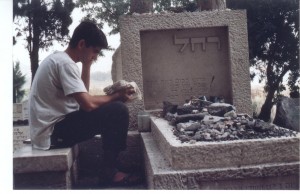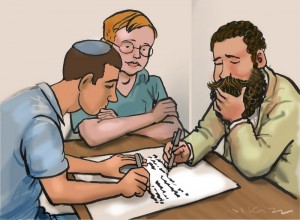
It’s six thirty-five a.m. as I pull my bike into Jerusalem’s Malha train station. The sun is rising over the seam where the Pat neighborhood’s low, long public housing projects abut the houses of Beit Safafa. A handful of inchoate off-white clouds float through the air like empyrean amoebas, seeking to grab unwary prey in fluffy pseudopods. I lock my bike at the rack and take the escalator up to the station two steps at a time. The security guard, usually stationed downstairs, has set up her table at the top today, to escape the chill. She’s padded in a thick parka, but I’m warmed up from my bike ride and raring to get on the train. I’ve got work to do.
The train ride from Jerusalem to Tel Aviv takes an agonizing 80 minutes—agonizing if you are in a hurry to get to a meeting or if you are one of those high-powered high-tech guys who get apoplectic when they discover that there’s no cell phone reception for half that time. But if you are on your way to visit your mother-in-law, as I am, it’s heaven.
And I don’t mean that longer is better when the trip is to my mother-in-law’s apartment. We get along just fine. What I mean is that in the two hours and forty minutes that I will spend on the train today, to Tel Aviv and back, I’ll get nearly an entire day’s work done. The cars are comfortable, roomy, and quiet. They’re equipped with tables to put your laptop on and sockets to plug it into. There’s no Internet to tempt me and none of the distracting paperwork that sits on my desk in my office at home. It’s just me and the book I’m translating, and there’s nothing a translator needs more than a place he can focus. And in this modern age, such places are few and far between.







